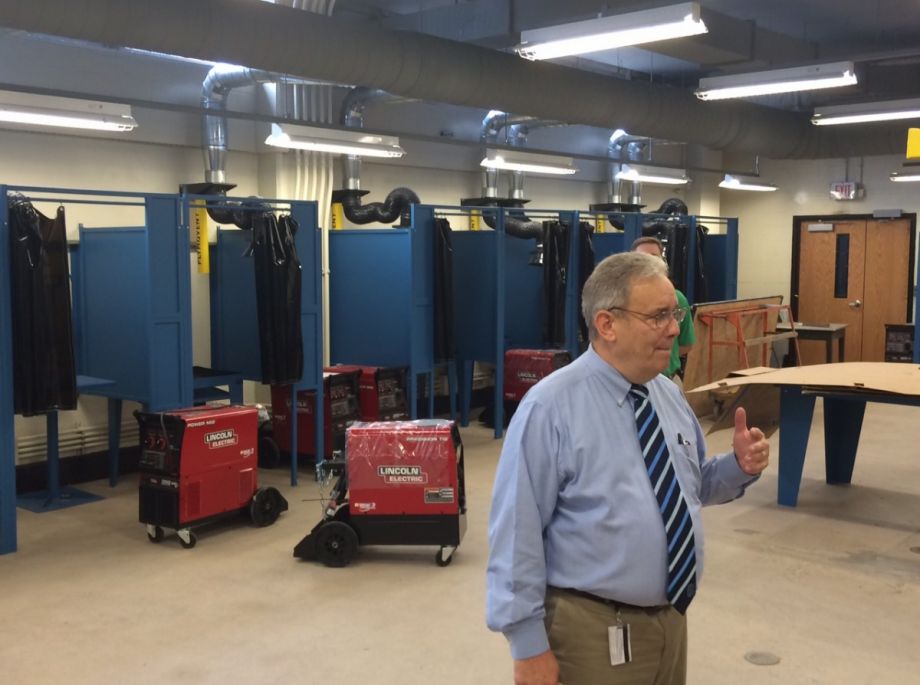Wet paint. Doors without lock sets. No air conditioning. That was the scene inside Philadelphia’s Benjamin Franklin High School last week, days before the school year began, with construction crews rushing to complete a new vocational training center. On first blush, the mundane hallway lined with blue lockers could be mistaken for any run-of-the-mill (no pun intended) wing of a public high school that might house shop class or home ec. But step inside the classrooms, and you’d find an eye-popping array of gadgets: milling equipment, 3D printers and high-end lathes that look like oversized droids out of Star Wars.
They’re all components of the brand-new Center for Advanced Manufacturing at a magnet school comprised of more than 95 percent minority students. “It’s still a work in progress,” said David Kipphut, head of the School District of Philadelphia’s Office of Career and Technical Education, while speaking on a tour for roughly 40 business leaders, government officials and media who’d come for a glimpse of the highly anticipated space.
While Kipphut tried to downplay the lack of finishing touches — no computers in the computer labs, for example — it wasn’t hard to see the potential of the $6 million center. Give it a few years, and Benjamin Franklin High could become the epicenter of advanced-manufacturing training in the region.
Today, the first day of school in Philly, an inaugural class of ninth- and 10th-grade students (about 150 in total) began coursework at the Center. They’ll be taking classes for two hours a day, five days a week, in four different career and technical education (CTE) programs that are currently up and running: welding, electromechanical technology, precision machine tool technology and electronics. In January, another four programs are expected to launch, including computer-aided design and renewable energy engineering. Students will eventually specialize in one of the eight disciplines and be expected to leave with a nationally recognized credential (or several). The hope at the Center for Advanced Manufacturing is that securing industry buy-in from the get-go will produce direct pathways into well-paying careers — some with the employers attending last week’s tour.
The hope is, by the time the Center’s filled to a capacity 800 students, it’ll make a dent in the largest roadblock facing the rebirth of manufacturing in Philadelphia: a deficit of high-skilled manufacturing workers. Upwards of 700 skilled manufacturing jobs are currently unfilled in Philadelphia because companies can’t find adequately trained individuals. And even the vacancies that are filled often require employers to go to great lengths — recruiting from California, bringing in temporary contractors or deploying costly on-the-job training.
“I’ve got a company that has to go through about 100 hires a year to find 10 keepers, and it’s costing them a fortune to do that,” says Steve Jurash, president and CEO of the Manufacturing Alliance of Philadelphia. “I can tell you the single biggest problem manufacturers have are finding enough trained people.”
Even though the average salary for advanced manufacturing jobs is about $50,000 in Philadelphia, there’s a paucity of workers waiting to fill those jobs, despite the fact that half of the positions don’t even require college degrees. Part of the problem is living in an age when career-track professions are unpopular among millennials, but part of it is a failure of the education system to stimulate interest in those professions. (As Alexis Stephens recently reported for Next City in “Can Treating PTSD Solve Urban America’s Employment Crisis?,” other complex socioeconomic issues factor in as well.)
It’s a problem not only in Philadelphia, but also across the country. According to a recent study by the Manufacturing Institute, the skills gap is costing manufacturers up to 11 percent of their earnings. And the deficit is only projected to get worse. Over the next decade, the shortfall of trained workers is expected to rise to two million, according to another study. That means that 60 percent of the demand for manufacturing workers won’t be met in the year 2025.
That is, unless there are more joint responses from school districts and industry leaders to get ahead of the problem, such as what’s opened today at Benjamin Franklin High.
“Before we even had a plan, we met with business people and talked about what they needed from the district in terms of preparing their future employees,” says Kipphut. Jurash put together volunteer industry advisory committees, which wound up curating everything from which programs to offer, how the classrooms should be laid out, and what credentials they should require from instructors (who are being brought in from the private sector).
“The school district doesn’t know what CNS machines are the best ones, or what the best lathe is to have,” says Jurash. “Nor would I expect them to.” The district also brought on Clyde Hornberger, executive director of the renowned Lehigh Career & Technical Institute, as a consultant on the project. So too were the Mayor’s Task Force for Advanced Manufacturing and the Delaware Valley Industrial Resource Center.
From the school district’s perspective, providing a workforce pipeline through CTE programs is also a self-serving endeavor. A 2014 report by the district’s Office of Research and Evaluation found that CTE-enrolled students graduated in four years at higher rates than the district average, 84 percent compared to 62 percent, and were considerably less likely to leave the district. Further, the achievement gap — 13 percent across the district — was cut down to 3 percent among CTE students.
That’s why, despite the district being heavily indebted, it committed capital funds to create the Center for Advanced Manufacturing. (There were also federal Perkins Funds, state subsidies and grants, and $2.5 million out of a larger private grant from the family of John Middleton, part owner of the Phillies.)
The center — along with renewed attention to CTE education across the School District of Philadelphia — gives students more solid workforce options. As Kipphut has said before, “In the world of CTE, we say, college is an option, but it’s not the only option.”
The Equity Factor is made possible with the support of the Surdna Foundation.

Malcolm was a Next City 2015 equitable cities fellow, and is a contributing writer for the Fuller Project for International Reporting, a nonprofit journalism outlet that reports on issues affecting women. He’s also a contributing writer to POLITICO magazine, Philadelphia magazine, WHYY and other publications. He reports primarily on criminal injustice, urban solution and politics from his home city of Philadelphia.

















